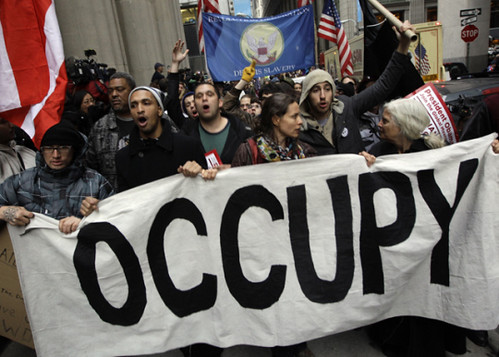
Demonstrations took place in the financial district in New York on November 17, 2011. Cops attacked and arrested protesters for standing up against Wall Street interests., a photo by Pan-African News Wire File Photos on Flickr.
Books Destroyed in New York
Published: November 18
When police raided Zuccotti Park in New York last week, they hauled off the 5,000 books from the Occupy Wall Street People’s Library. About 1,000 have since been discovered in a Manhattan sanitation garage, but the others may be compost by now. Among them: Herman Melville’s “Bartleby, the Scrivener: A Story of Wall-Street” (1853), Jonathan Lethem’s “The Ecstasy of Influence” (2011) and four copies of my son Ben Ehrenreich’s new novel, “Ether” (2011), which I know was there because I took them to Zuccotti Park myself in mid-October.
New York City’s assault on innocent books is arousing widespread revulsion. Stating that “people who would ransack and trash a library or a book collection put themselves on the moral level of book-burner,” Common Cause is demanding that Mayor Michael Bloomberg’s administration replace all the stolen and ruined books — in duplicate.
There’s also been some talk at the Freedom Plaza encampment in D.C. about re-creating the Occupy Wall Street library out of books donated from people around the country, and possibly making it mobile.
I’m already pulling books off my shelves for the delectation of future Occupiers, and the problem is there are just too many of them: Manning Marable’s “Malcolm X: A Life of Reinvention” (2011), Edgar Snow’s “Red Star Over China” (1938), Todd Gitlin’s “The Sixties: Years of Hope, Days of Rage” (1980) — and how about Ruth Rosen’s “The World Split Open: How the Modern Women’s Movement Changed America” (2000)?
But if I expect to lug a box to the post office, I’m going to have to be a little more selective. So here’s my short list of books relevant to the 99 percent:
1. Howard Zinn’s “A People’s History of the United States” (1980): An obvious, maybe cliche choice, I admit, but when my nephew read it last year, after months of unemployment and underemployment, he said, essentially: “Oh, now I get it!”
2. Frances Fox Piven and Richard Cloward’s classic “Poor People’s Movements: Why They Succeed, How They Fail” (1978) because to a large extent, Occupy is a poor people’s movement — a movement of the unemployed, of debtors, of low-wage workers and the homeless.
3. Adam Hochschild’s “Bury the Chains: Prophets and Rebels in the Fight to Free an Empire’s Slaves” (2005) because it so perfectly illustrates Margaret Mead’s iconic statement: “Never doubt that a small group of thoughtful, committed citizens can change the world.”
And for those Occupiers who continue to defy police harassment, I’m going to throw in a few manuals on Arctic survival.
No comments:
Post a Comment